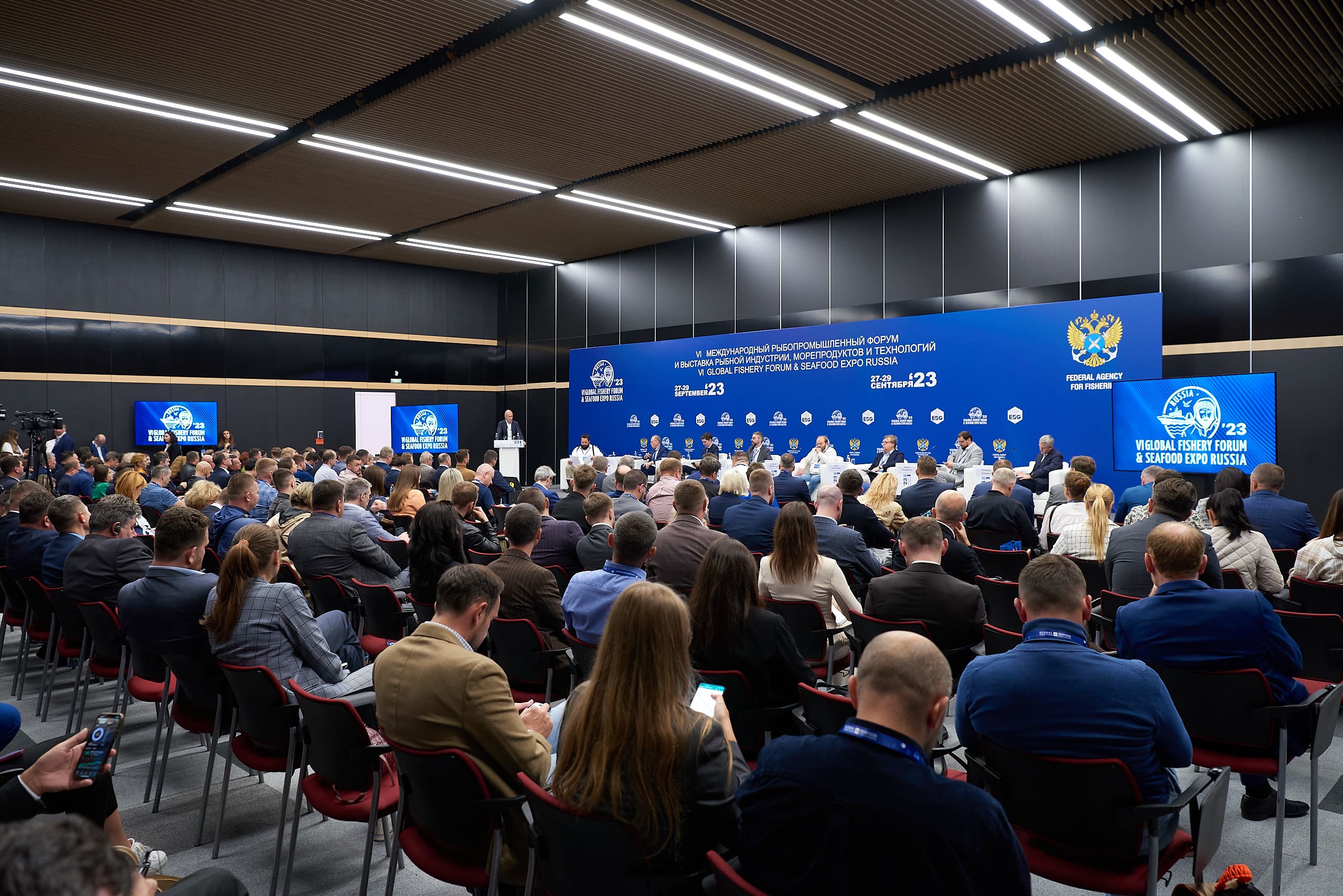The ‘Expansion on the Domestic Market and Increased Consumption of Russian Fish within the Country’ roundtable took place on Day 1 of the VI Global Fishery Forum & Seafood Expo Russia.
The importance of this issue is supported by the FAO data to the effect that the volume of aquatic biological resource production (excluding aquaculture) has fallen by 2 mln tonnes, or −2.2%, over the past ten years. At the same time, the planet's population has grown by 0.75 bln people, or +10%, over the same period.
New countries are entering the global markets and the worldwide competition for natural protein is intensifying.
Meanwhile, consumption of fish and seafood in Russia has been stagnating for several years now. By various estimates, it ranges from 15 kg to 22 kg per capita per annum, while the research-backed standard for Russia is 28 kg.
The consumption disproportion between different age groups is also growing. According to the Russian Public Opinion Research Centre, weekly consumption of fish and fish products in the 18–24 age group has dropped from 55% in 2018 to 21% in 2023.
The roundtable participants discussed Russian fish market problems and how to deal with them, how to flood the market with diverse and affordable fish products, and make these products attractive and desirable to Russians of all ages.
“Russian people used to ask us where the fish was; now they ask where the cheap fish is,” Vasily Sokolov, Deputy Head of Federal Agency for Fisheries, said in his speech, pointing out the two main concerns that must be addressed to make fish products desirable and affordable to Russians.
“Our domestic capture volume allows us to flood the home market with fish products, and we import anything that is missing. Yet, we should consider the mindset of the younger generation. They do not want to stand by the stove and cook frozen fish, like we used to. What they want is to buy ready-made products that are easy to cook and do not take long to prepare.
As far as fish prices go, they are rising worldwide. In Russia, one reason for this is the sanctions pressure on the industry, resulting in higher costs of logistics and imported equipment. The investment costs that fishermen and fish processors pay to ensure development of their assets, as well as the increased tax burden on the industry, also play a role.”
Vasily Sokolov mentioned that use of Internet technologies to provide fish products to the poor at an affordable price could solve this problem.
“This is very easy from the technical standpoint. There are different online platforms that can be used to generate a register of low-income citizens and provide them with fish products at an affordable price on a case-by-case basis.”
Vladimir Solodov, Governor of Kamchatka Territory, spoke mainly about the need to promote fish among the population.
“We need to explain to people that it is not an end in itself to eat a lot of fish but it is a really healthy habit,” Vladimir Solodov said.
The Governor believes there is no conflict between the export of Russian fish to global markets and the degree of saturation on the home market. Even so, the influence exerted by the ruble exchange rate against foreign currencies on the domestic pricing of fish products should be taken into account.
“Of course, predicting the prices of fish products on the domestic market is quite a challenge given the high volatility of the ruble exchange rate but we need measures to offset the influence of this factor.”
Vladimir Solodov proposed developing and adopting a long-term government programme for promoting fish products on the Russian market. This programme would involve government contracts as a demand driver, a focus on supporting the manufacture of highly processed end products, increased fishery logistics efficiency and long-term information support measures.
Anton Kukanov, Deputy Head of the Russian Quality System, mentioned the high prices of fish products, low quality of fish in the general segment, lack of consumer information about fish and how to choose it, as well as an inadequate range of easy-to-cook fish products as the main reasons hampering development of the domestic fish market.
“We need long-term campaigns designed to promote undervalued fish, fish whose catch volumes could be increased, as well as to educate consumers about the benefits of eating fish, what to look for when buying it, and how to cook fish dishes,” Anton Kukanov said.
Amid the frequently mentioned high prices deterring greater consumption of Russian fish within the country, the speech offered by Leonid Ardalionov, Director of Analytics at NTech research company, sounded somewhat dissonant.
“Our research shows that high prices are not the main bottleneck in the development of the domestic fish product market; instead, it is the poor choice and a lack of easy-to-cook or ready-to-eat products. As we all know, the 30+ generation is the ‘snack’ generation,” Leonid Ardalionov said.
He thinks we also need to consider what kind of fish dishes children like, since they are the ones who generate the fish menu in the family.
“That is why fish product manufacturers chiefly need to work on their product range,” the speaker concluded.
Igor Karavaev, Chairman of the Presidium at the Association of Retail Trade Companies (AKORT), proposed a somewhat conflicting opinion.
“We see there is no promotion of fish on the domestic market. Still, the inability to cater fully to the needs of the younger generation is not the only reason. Our senior citizens buy fish, too. And we see that customers are buying the products they are accustomed to. That is why we should shape the consumer's diet,” Igor Karavaev believes.


